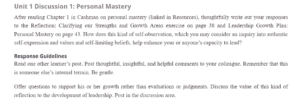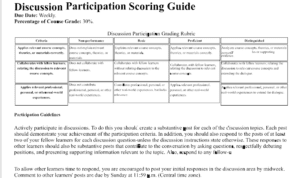Personal Mastery
Imagine observing a dear friend talking about you with heartfelt love and Admiration. What would your friend be saying?
If a dear friend talks about me with heartfelt love and admiration, I think they would say that I am very focused and determined. I believe they would say this because I am always helping my friends work harder and achieve their goals.
Are you interested in obtaining an unpublished version of “Personal Mastery”? We are ready to assist.
When energized and inspired, what personality traits and strengths are you expressing?
I would express traits when energized and inspired, including being adventurous, imaginative, and fearless. When I am feeling energized, I tend to believe in myself more. I tend to be more willing to try new things, including those I would be ordinarily afraid to do. When in this mood, I tend to express the strength of courage by being ready to try new things. I also tend to be strong at creativity in such attitudes.
What are some of your conscious beliefs?
Conscious beliefs are open and known (Cashman, 2017). These are the beliefs that most people I interact with and I know;
- I believe everyone deserves to be treated equally regardless of their characteristics.
- I believe that I am creative.
- I believe hard work and determination can help anyone achieve what they want.
What are some of your shadow beliefs?
The following are the unconscious beliefs that tend to influence my day-to-day life.
- I believe that everything I do has to be perfect
- I think I must be aware of everything happening around me.
- I always believe that I should never be average. In everything I do, I must have above-average achievement.
When you are leading with character, what qualities come forth? Do certain situations inhibit or express your personality more?
When leading with character, one quality that comes forth is my interpersonal skills. I tend to be a good communicator, and my interactions with others tend to be positive. Additionally, I tend to be motivated and courageous when leading with character. I find this form of leadership to be internally pleasing. Therefore, I get motivated to achieve the best. What could inhibit or show my character more is the kind of people I work with. If the team members are cooperative, then my feeling is enhanced.
When you’re leading by coping, what qualities come forth? What beliefs of fears generate a reactive state of mind, emotion, or behavior?
When leading by coping, I tend to be quite irritable. I get annoyed easily when the people I teach do not do exactly what I want. Since this leadership is guided by the desire to get through a challenge (Weese, 2017), I feel like people sabotage that goal when they fail to do as they need to. I fear that if things do not go exactly how I planned them, I will die.
What do others consistently tell you you need to work on or develop? What new behaviors are you committed to practicing?
I have been told by more than one person that I need to learn to be tolerant of other people’s beliefs and opinions, especially on controversial topics. I tend to be easily irritated by people whose beliefs are not in life with mine. I am committed to learning how to listen and to think about issues from more perspectives than mine to be more tolerant of different opinions.
At the end of your life, what do you hope people will thank you for contributing?
At the end of my life, I would like people to thank me for being a positive driver in people’s lives. Regardless of the dire situation, I always try to find the positive side and influence people around me to do the same.
If you decide to take a new approach to living or leading, what would this new approach be?
If I took a new approach to living, I would always be driven by purpose. I would take a transformational approach to leading where I always have a sense and work hard to inspire others to achieve that purpose.
Leadership Growth Plan
Areas to build awareness: I need to build awareness of the effects of my obsession with perfection. My shadow beliefs are mainly focused on achieving my best, which can be good when managed correctly. However, in my case, it is enhancing my inability to finish things because I am chasing an irrational need to be perfect.
- New commitments to make
- To explore my desire to achieve perfection
- To learn how to be more tolerant of people different from me.
- To learn how to control my emotions and reactions when leading others.
- New practices to begin
- To be welcoming for constructive feedback from friends and colleagues
- To meditate every day to learn calmness and emotional control
- To set realistic standards for every project I work on.
- Potential Obstacles
- My procrastination behavior
- Fear of change
- My belief in perfection.
- Timeline and measures of success
- In three months, I completed all my projects on time
- In a month, have less frequency of being emotionally triggered by negative comments from others.
Other Related Post: New Science Summary
References
Cashman, K. (2017). Leadership from the inside out Becoming a leader for life. Berrett-Koehler Publishers.
Weese, W. Z. (2017). Character In Leadership: Perceptions Of Canadian Intercollegiate Athletics Administrators.
ORDER A PLAGIARISM-FREE PAPER HERE
We’ll write everything from scratch
Question
Unit 1 Discussion 1: Personal Mastery
After reading Chapter 1 in Cashman on personal mastery (linked in Resources), thoughtfully write your responses to the Reflection: Clarifying our Strengths and Growth Areas exercise on page 38 and Leadership Growth Plan: Personal Mastery on page 43. How does this kind of self-observation, which you may consider an inquiry into authentic self-expression, values, and self-limiting beliefs, help enhance your or anyone’s capacity to lead?

Personal Mastery
Response Guidelines
Read another learner’s post and post thoughtful, insightful, and helpful comments to your colleague. Remember that this is someone else’s internal terrain. Be gentle.
Offer questions to support their growth rather than evaluations or judgments. Discuss the value of this kind of reflection to the development of leadership. Post in the discussion area.
Resources
- Discussion Participation Scoring Guide.
- Leadership From the Inside Out: Becoming a Leader for Life (3rd ed.).

Discussion Participation Scoring Guide

